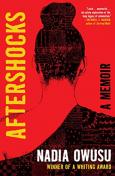
by Nadia Owusu
Hardcover- $22.99
Click on the ORANGE Amazon Button for Book Description & Pricing Info
Overall rating:
How would you rate this book?
Member ratings
Aftershocks, Nadia Owuso, author; Kathleen Cook and Kathleen Conte, narrators.
This is a well written, lyrical memoir that moves back and forth in time as it suits the author’s purpose. Like an earthquake, the book’s message will reverberate through the reader as the author tries to illuminate the problems that shook her life and to explain how she reconciles with those with whom she has broken ties that now need to be mended. As she describes the events in her life, she reveals little pieces of history that had a traumatic influence on her, an earthquake in Armenia, 9/11 in Manhattan, the Aids epidemic in Africa, her Ghanaian heritage, attending school in England, the Armenian genocide, the Ashanti slave trade, living through political upheaval in Ethiopia, living in Uganda, Tasmania and Italy, witnessing the difference between the haves and the have- nots and the way each were treated, and visiting and learning about the historic world landmarks, and more.
Nadia had a very interesting, but troubled life. She was born in Tasmania. Her mother is an American Armenian and her father is from Ghana. They are an interracial couple. Nadia looks like her mother, but has the skin color of her father. People question her origin and identity, forcing her to deal with the wrath of racism from an early age before she was emotionally mature enough to deal with it or understand it. Is anyone ever prepared to deal with that behavior?
When she was abandoned by her mother, she was raised by her father, Osei, whom she adored and idolized. When he was forced to travel for his job with the United Nations, he sent Nadia and her sister Yasmeen to live with relatives in England. When Osei married Anabel, Nadia and her sister were returned to his care. Soon her brother Kwame was born. Nadia resented Anabel because she wanted her father all to herself.
The family lived in many places because of her father’s work, requiring Nadia to adjust to the moves. Often, she resented his absence. Nadia wondered why she was a different color than her mother, her school friends did as well. She questioned her own identity. She struggled as she learned that the way she spoke could often determine how she was received. If she spoke with her English accent, like an educated White person, the reception was more positive. She called choosing a manner of speech, code-switching.
At school, when she was one of only two black girls, she wanted to be accepted and so went along with the white, popular group, although they were cruel to Agatha the only other black student. She was not as cultured and she had no family close by to support her. Later, Nadia was ashamed of her own cruelty. She struggled with feelings of resentment often. When she was rejected, she often blamed it on her race and her mother or step-mother.
The author admits that her description of the events in her life may be out of order and even possibly embellished by an imagination with a mind of its own or perhaps, a misrepresented memory. She is often concerned about her own behavior, questions the actions of her ancestors and finds it hard to trust relationships with others. Although she is honest about the racist events in her life, she also is one of the few authors that has placed some blame for slavery on Africans. She explains that the slave trade in Africa flourished as the British and the Ashanti Tribe began to trade goods for the humans that the Ashantis hunted and captured to sell to them
I was so impressed with this writer’s openness and introspection as she analyzes her behavior and that of others. As she matures and begins to understand more about the trauma she experienced and the hardships she witnessed, that were imposed on those she was close to, she grows and becomes more mature. As she describes her effort to flourish in a world that does not always welcome her, she remembers the incidents in her life that shaped her behavior and beliefs. She discovers that she too has the same faults she may accuse others of having. Sometimes, she also prejudges or behaves terribly to be accepted. As Nadia’s love for her father Osei, becomes almost an obsession, it causes a rift between her stepmother and herself. After her father’s death, she also rejects her birth mother because she not only abandoned her and moved to America to begin a new life with a new husband and a new family, but she refused to take Nadia and her sister when their father, her ex-husband, died. Still, slowly, with therapy and maturity, Nadia is beginning to mature and work through her fears, insecurities and prejudices.
Because of the nature of my husband’s work, I moved around a lot also, although it was within the United States. My children were sometimes put out, but we were lucky since our family stayed intact. All my children had to figure out was, “where was home”? They decided that home was wherever we were all together; wherever we lived was home. The place did not matter, being together did. As Nadia discovers that, she begins to come of age, make amends and renew old relationships she had let die.
Book Club HQ to over 90,000+ book clubs and ready to welcome yours.
Get free weekly updates on top club picks, book giveaways, author events and more








